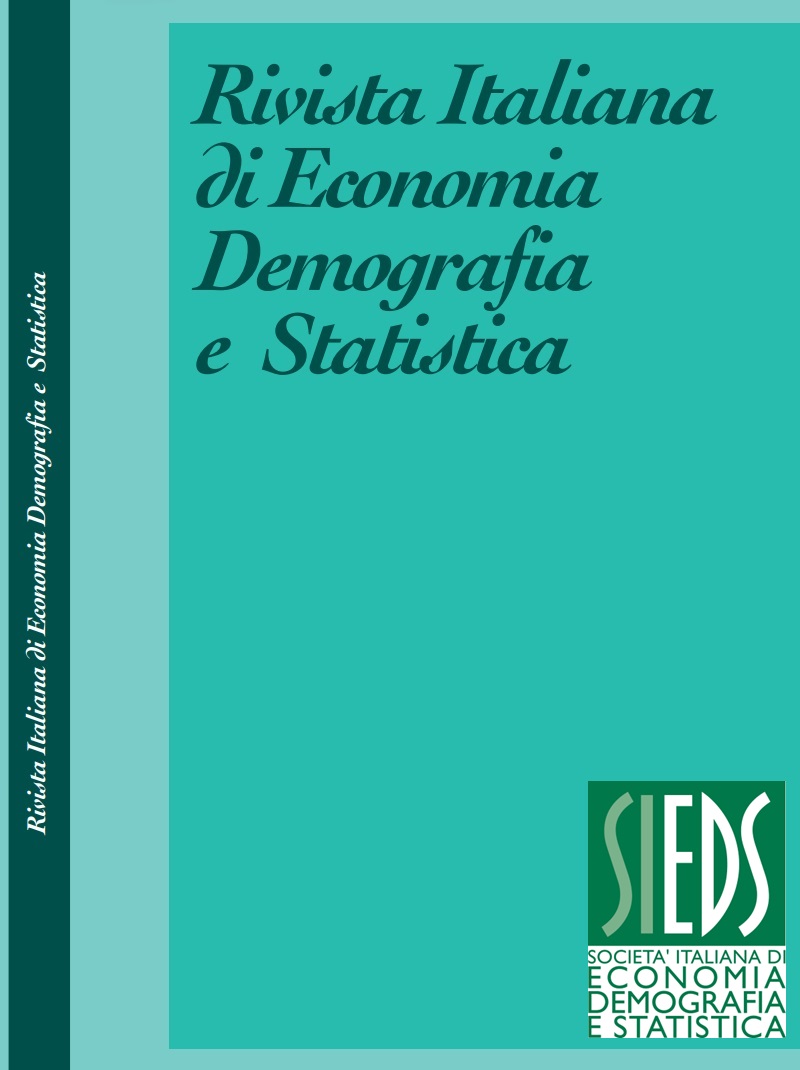Does discussing with the supervisor enhance the effects of training?
DOI:
https://doi.org/10.71014/sieds.v79i3.288Abstract
In Italy, weak economic growth is primarily due to businesses' reluctance to invest, hindering both human and physical capital accumulation, which are key drivers of productivity and innovation. The capitalization of knowledge also contributes to creating virtuous exchanges between trained employees and their supervisors, allowing companies to derive growing benefits.
This study aims to investigate the likelihood of positive changes occurring in firms following training received by workers. Specifically, it examines the probability that the worker will experience positive changes in the company after completing the training course and in particular, it emphasizes the importance of discussing the training path with one's supervisor.
To achieve these research objectives, we employ a probit model. The data from the ROLA survey will make it possible to analyse a significant sample of employees trained through Italy's largest interprofessional fund. The survey (conducted by Fondimpresa in collaboration with INAPP) is instrumental in understanding the impact of training funded by Fondimpresa and whether it achieves desired outcomes, such as supporting corporate investments, particularly in innovation and sustainability, and facilitating organizational and process innovation. This contribution demonstrates that discussing training content with the supervisor enhances the multiplier effects of training. The results of the estimates confirm that these effects are more pronounced when discussing training activities with one's supervisor after completing the training program.
References
AGRESTI A. 2012. Categorical data analysis, Vol. 792. John Wiley & Sons.
ANTHONY E.L. 2017. The impact of leadership coaching on leadership behaviors, Journal of Management Development, Vol. 36, No. 7, pp.930–939. DOI: https://doi.org/10.1108/JMD-06-2016-0092
BAKKER A.B., SCHAUFELI W.B. 2008. Positive organizational behavior: engaged employees in flourishing organizations, Journal of Organizational Behavior, Vol. 29, pp. 147-54. DOI: https://doi.org/10.1002/job.515
BAKKER A.B., DEMEROUTI E. 2007. The job demands-resources model: state of the art, Journal of Managerial Psychology, Vol. 22, No. 3, pp.309–328. DOI: https://doi.org/10.1108/02683940710733115
CHAUDHARY R., AKHOURI A. 2018. CSR attributions, work engagement and creativity: examining the role of authentic leadership, Academy of Management Proceedings, Vol. 2018, No. 1, p.16800, Academy of Management, Briarcliff Manor, NY 10510. DOI: https://doi.org/10.5465/AMBPP.2018.16800abstract
ENGELBRECHT A.S., HEINE G., MAHEMBE B. 2017. Integrity, ethical leadership, trust and workengagement, Leadership & Organization Development Journal, Vol. 38, No. 3, pp. 368–379. DOI: https://doi.org/10.1108/LODJ-11-2015-0237
FERRI V., IENCENELLI N. 2024. La sfida della formazione in azienda nell’era delle twin transition, FONDIMPRESA INAPP.
FERRI V., IENCENELLI N. 2022. Formazione continua, innovazione e cambiamenti, FONDIMPRESA INAPP.
FIROUZNIA M., ALLAMEH S. M., HOSSEINI S H. 2021. Engaging leadership, engaging environment, engaging job, and engagement, International Journal of Process Management and Benchmarking, January 2021, DOI: 10.1504/IJPMB.2021.113740. DOI: https://doi.org/10.1504/IJPMB.2021.113740
GILLEY J.W., SHELTON P.M., GILLEY A. 2011. Developmental leadership: a new perspective forhuman resource development, Advances in Developing Human Resources , Vol. 13, No. 3,pp. 386–405. DOI: https://doi.org/10.1177/1523422311424264
HARTER J.K., SCHMIDT F.L., HAYES T.L. 2002. Business-unit-level relationship between employee satisfaction, employee engagement, and business outcomes: a meta-analysis, Journal of Applied Psychology, Vol. 87, No. 2, p.268. DOI: https://doi.org/10.1037//0021-9010.87.2.268
HOSSEINI A. S., SOLTANI S., MEHDIZADEH M. 2018. Competitive Advantage and Its Impact on New Product Development Strategy (Case Study: Toos Nirro Technical Firm), Journal of Open Innovation Technology Market and Complexity, May 2018. DOI: https://doi.org/10.3390/joitmc4020003
KARATEPE O.M., DEMIR E. 2014. Linking core self-evaluations and work engagement to work-family facilitation: A study in the hotel industry, International Journal of Contemporary Hospitality Management Vol.26, No. 2. DOI: https://doi.org/10.1108/IJCHM-01-2013-0008
KOMPIER M. 2003. Job design and well-being, in SCHABRACQ, M.J., WINNUBST, J.A.M. AND COOPER, C.L. (Eds), The Handbook of Work and Health Psychology, 2nd ed., Wiley, Chichester, pp. 429-54. DOI: https://doi.org/10.1002/0470013400.ch20
LUTHANS F. 2002. Positive organizational behavior: developing and managing psychological strengths, Academy of Management Executive, Vol. 16, pp. 57-72 DOI: https://doi.org/10.5465/ame.2002.6640181
MACEY W.H., SCHNEIDER B. 2008. The meaning of employee engagement, Industrial and Organizational Psychology, Vol. 1, No. 1, pp. 3–30. DOI: https://doi.org/10.1111/j.1754-9434.2007.0002.x
MEIJMAN T.F., MULDER G. 1998. Psychological aspects of workload, in DRENTH, P.J.D. AND THIERRY, H. (Eds), Handbook of Work and Organizational Psychology, Vol. 2, Psychology Press, Hove, pp. 5-33.
MAY D.R., GILSON R.L., HARTER L.M. 2004. The psychological conditions of meaningfulness, safety and availability and the engagement of the human spirit at work, Journal of Occupational and Organizational Psychology, Vol. 77, pp. 11-37. DOI: https://doi.org/10.1348/096317904322915892
POURBARKHORDARI A., ZHOU E. H. I., POURKARIMI J. 2016. How Individual-focused Transformational Leadership Enhances Its Influence on Job Performance through Employee Work Engagement, International Journal of Business and Management , January 2016. DOI: https://doi.org/10.5539/ijbm.v11n2p249
SARTI, D. 2014. Leadership styles to engage employees: evidence from humanservice organizations in Italy, Journal of Workplace Learning, Vol. 26, Nos. 3/4, pp.202–216. DOI: https://doi.org/10.1108/JWL-09-2013-0066
SCHAUFELI W. B., SALANOVA M., GONZÀLEZ-ROMÀ V., BAKKER A. B. 2002. The Measurement of E-ngagement and Burnout: A Two Sample Confirmatory Factor Analytic Approach. Journal of Happiness Studies, Vol. 3, No. 1, pp. 71-92, January, 2002. DOI: https://doi.org/10.1023/A:1015630930326
SCHAUFELI W.B. 2015. Engaging leadership in the job demands-resources model, Career Development International, Vol. 20, No. 5, pp.446–463. DOI: https://doi.org/10.1108/CDI-02-2015-0025
SCHAUFELI W.B., SALANOVA M. 2007. Work engagement: an emerging psychological concept and its implications for organizations, in GILLILAND, S.W., STEINER D.D., SKARLICKI D.P. (Eds), Research in Social Issues in Management: Managing Social and Ethical Issues in Organizations, Vol. 5, Information Age Publishers, Greenwich, CT.
Downloads
Published
Issue
Section
License
Copyright (c) 2025 Valentina Ferri, Salvatore Marsiglia, Giuliana Tesauro

This work is licensed under a Creative Commons Attribution 4.0 International License.



